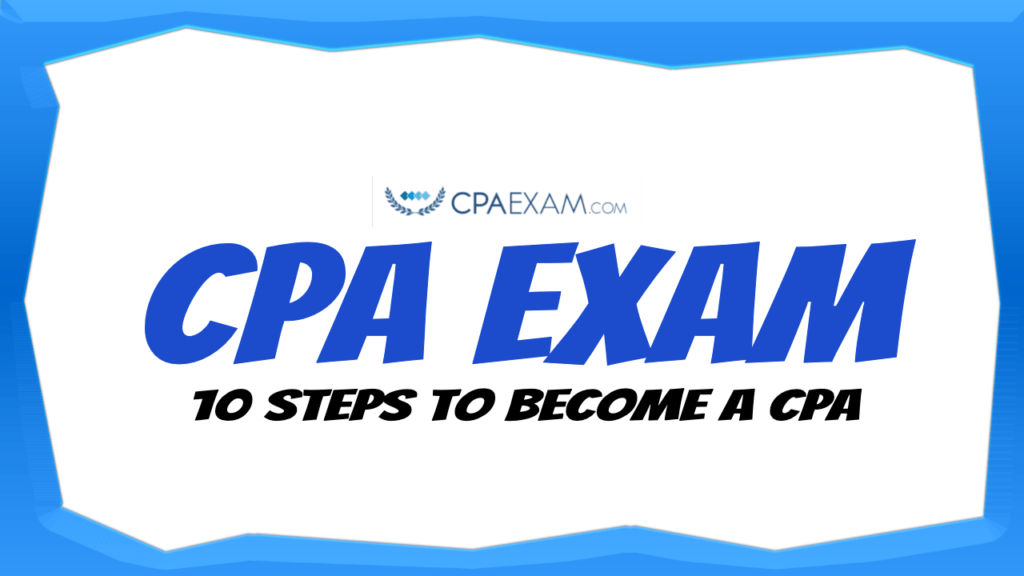
CPA Exam Tips | 10 Steps To Pass & Become a CPA
Achieving success on the CPA Exam is a major accomplishment as you work towards becoming a Certified Public Accountant. To help guide and prepare you for this monumental exam, here are some CPA Exam tips to take to pass the CPA Exam and Become A CPA:
Understanding the CPA Exam Structure
1. Before you begin studying for the CPA Exam, take a moment to understand precisely what is required of you. The exam consists of four sections: Financial Accounting and Reporting (FAR), Auditing and Attestation (AUD), Regulation (REG), and Business Environment Concepts (BEC). Each has its own topics that must be understood to pass with flying colors! One of our best CPA Exam tips is to be sure to also look into your state’s regulations on taking this vital test so there will be no surprises later.
Know Your State’s CPA Exam Requirements
2. Ensure you are informed of your State’s CPA Exam Requirements: Before sitting for the exam, acquaint yourself with all prerequisites laid out by your state’s board of accountancy. As there is variability in regulations between states, it is pivotal that you take the time to properly understand what qualifications must be satisfied before commencing study. Staying up on the requirements to take the CPA Exam is key.
Invest in the Right CPA Review Courses
3. Now that you’ve verified your eligibility, investing in comprehensive CPA Review Courses is time. With numerous options available, like online courses, self-study guides, and classroom instruction, selecting the one that works best for you is essential to maximize your chances of excelling on the exam. Furthermore, ensure that the course can keep pace with any alterations made to the CPA Exam to make sure to experience newly added content or changes to the CPA Exam topics. If you only follow one of our CPA Exam tips, follow this: pick the best CPA Review course for you.
Preparing for Each Exam Component
4. Prepare for each segment: After picking a study program, it is time to prepare for each examination component. This involves studying financial accounting principles, auditing criteria, business law ideas, and tax regulations. It is also significant to practice with sample assessments to become comfortable with the format and types of inquiries asked on test day.
Sign Up for the CPA Exam
5. If you feel confident in your exam prep and knowledge, it’s time to sign up for an upcoming testing date at a Prometric test center near you or through their online proctoring service if available. Don’t miss the opportunity to take advantage of this invaluable resource!
Practice Tests: Key to Building Confidence
6. Ready to ace the exam? As part of your roadmap toward success, make sure you take as many practice tests as possible. That way, not only will you become familiar with actual test questions, but you will also build up confidence within yourself before taking on this endeavor!
Taking the CPA Exam
7. Take the real thing: After arduous months or even years of work, it’s time to tackle this challenge head-on! To ensure you’re ready for the experience at hand, make sure you arrive early, 15 minutes before your assigned appointment. It’s important to note that the CPA Exam scoring is a relative mystery, and the CPA Exam pass rates are low, so if you come up short, don’t be discouraged! You’ll get there.
Getting Your CPA Exam Results
8. Get to know your scores: Following the test, you’ll receive a notification indicating whether or not you’ve successfully passed. This can take up to four weeks, so make sure you plan accordingly. If necessary, review the results of your exam and identify the most challenging topics that require additional preparation before retaking it.
Celebrate Your CPA Success
9. Celebrate! Once all four sections have been passed with flying colors, congratulations are in order! You have officially become a CPA – enjoy the moment and pat yourself on the back for all your hard work!
Maintaining Your CPA License
10. Now that you’ve earned your CPA license, stay informed of any ethical and legal considerations related to practice requirements as dictated by your state’s board of accountancy. Be sure to fulfill any continuing professional education (CPE) credits necessary for you to retain your license. Congratulations once again, and don’t forget to take a well-deserved break! Now it’s time to put your exam knowledge to the test! Good luck!